

1 INTRODUCTION The Weidenfeld-Hoffmann Scholarships & Leadership Programme Annual Report 2020-2021
Helen Mountfield QC
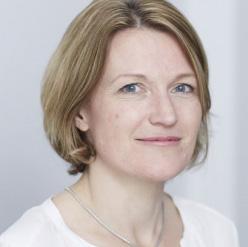 Alina Barnett Principal Mansfield College, University of Oxford
Alina Barnett Principal Mansfield College, University of Oxford

The leadership forum left me thinking that the world may not be in the terrible state I fear when it is in the hands of such capable, committed, supported and principled young people. The mutual benefit for the WHT/Kofi Annan scholars and Mansfield was extraordinary; all of them contributed hugely to the life of our college, lockdown notwithstanding, and took advantage of the many opportunities that Mansfield offered. I have been involved in other leadership networks before. But I see now why this one is a passion-project for you, and why it is worth fighting to embed.”
Trustee Weidenfeld-Hoffmann Trust
The Weidenfeld-Hoffmann Trust, in partnership with Oxford University, has continued to provide access to a world class education to many aspiring young people against the challenging backdrop of the pandemic. It is impressive how effective the Leadership programme has been at engaging, motivating and inspiring students to become responsible leaders who take actions to make the world a better place in which to live. The Enterprise Challenge which requires students to develop a socially driven business idea from concept to prototype is just one brilliant example.”
2
““
A SCHOLARSHIP AND LEADERSHIP PROGRAMME FOR THE 21ST CENTURY
In2015, Lord Weidenfeld’s friends marked his 95th birthday by raising funds to endow this programme. Through the instrumental contributions of its first Chairman, André Hoffmann, together with the support of Trustee and current Chairman, Michael Lewis, family members, Alina and Ben Barnett, and a very active and generous Advisory Board, the Programme is poised to help solve the world’s most pressing problems, by empowering the brightest and best from across the globe to receive a worldclass education at Oxford. The WeidenfeldHoffmann Trust is more than a Scholarship. The tailor-made Leadership Programme jump starts the ambitions of young leaders, equipping them to return to their regions and countries of origin to shine a light of hope and make meaningful contributions in Sustainability, Business, Law, Education, Digital Technologies, Governance, Diplomacy and Health.
“Does it really matter that 30 people a year go to a top University? Does it really make a difference in the world? Can we contend that we have fulfilled our duty and responsibility of making the world a better place if we give 30 young people the opportunity to do this? I believe it matters a great deal . . . The Leadership Programme goes over and above what the University teaches, it creates a community, a sense of cohort, of people who can talk to each other and share solutions.”

3 INTRODUCTION
André Hoffmann Co-founder and Trustee, Weidenfeld-Hoffmann Trust
Investment in young people is the most tangible expression of faith in the future. This partnership between the Trust and Oxford University is a brilliant way to realise this ambition.”


Oxford University has been welcoming international students at least as far back as the 12th century. Today the WeidenfeldHoffmann Trust annually brings to Oxford a group of talented young people committed to improving the world around them. Our entire community is enriched by their presence.”
 Michael Lewis
Michael Lewis
Prof Louise Richardson Chairman of Trustees, Weidenfeld-Hoffmann Trust
Vice-Chancellor, University of Oxford “ “
END OF YEAR OVERVIEW
The cohort of 2021 finally met in person on the 2nd of July at Cumberland Lodge — it was like being greeted by 30 giant bottles of champagne all popping at the same time! The excitement in the air was palpable and remained so throughout the weekend right up to our farewell dinner four days later.
During that time, the students each spoke about their Oxford experience in this exceptional year, and it was a roller coaster of emotions — each adding their unique story to the tapestry of a cohort from twenty different countries. They were kind about the Trust and the role it had played, they were also grateful for the support received by the partner colleges, but above all they talked movingly about the interactions with their fellow scholars, which had got them through the difficult moments.

For that I must thank the seven colleges who have partnered us and created bubbles for our scholars. They understood the need to provide safe communal spaces to meet, eat and work
in — thank you for believing in us and helping us so much! We also must thank the donors who have made this possible.
In the end we have been able to complete the Leadership Programme, not as we had anticipated, but nonetheless all aspects were covered. Our end of year feedback recorded a top 80% score for the community bonding part of our programme and this is brought home by the photographic record we have included in the following pages.
We began, rather optimistically as it turned out, with an introductory session in September in the large and austere rooms of the Town Hall. We had asked the cohort to get to Oxford early so that they could get the quarantine over and done with before we met. In the end only half were with us in person, while the other half had to attend online. Nevertheless they were introduced to the first two of our five core Moral Philosophy seminars, and got to brainstorm ideas for their business enterprise challenge.
5 INTRODUCTION
We had hoped this would turn into a full faceto-face term, instead we found ourselves back in lockdown. I was concerned zoom did not provide enough variety for our students who already spent too many hours on it for their academic studies, so we explored other options. Thanks to our Advisory Board member, Justin Gayner, we learnt about miro, which we used to brainstorm ideas for the annual cookbook and lockdown activities. The scholars turned the annual cookbook into a Yearbook full of art, literature, and music — each student conjured up something or somewhere they were missing. And among the ideas for lockdown was a talent show which finally took place in person right at the end of the year, bringing all of us to our feet.
Another scholar led activity which was very successful this spring was the annual debate. The students threw themselves enthusiastically into the task and they were helped by being able to hold it in the Oxford Union’s debating chamber. The motion was very topical: “This House Believes Social Media Platforms Have a Right to Ban Politicians”. They were ably led by Karan Gupta who invited Tom Fletcher, the Principal of one of our partner colleges, Hertford, to chair the proceedings. The students rose magnificently to the occasion and although the covid restrictions limited the numbers, you would not have known it such was the passion and conviction of each speaker, the excellent questions both from the floor and from our streaming audience and the venue which some noted may not have seen such a diverse cohort debating together. In the end those who wanted to limit the power of the social media organisations won the day.
One area of the Leadership programme that benefited from the extra time allowed by lockdown was the Enterprise Challenge, led by Irina Fedorenko, supported by
Atherton Mutombwera, both alums. At the final round of pitches, during the Leadership Forum at Worcester College, we were joined by a distinguished group of business advisers who were impressed by what they saw and heard. In fact, our students have already had considerable success. Tafadzwa Matika won the Foundry intercollege Ideas Competition with a start-up for last mile deliveries in Zimbabwe. Prerna Wadikar was awarded the Vice Chancellor’s Impact Award for her exceptional commitment to positive social change through her Project Jeeva. And Tamarie Rocke has been selected for a summer internship at the Oxford Foundry.
The WHT alums have played an ever-increasing role in the Trust over this time: key highlights were two online conferences that brought together more than fifty alums, partners, and trustees. The first one, last November, was in partnership with the Louis Dreyfus Foundation and focused on sustainability and the future of food security. The second one, in May, focused on climate change and asked alums, joined by André Hoffmann, to come up with impact actions. We were also joined across the year by sixteen alums bringing us snapshots of their worlds from a small coffee business in Vietnam to multilateral development banks in Saudi Arabia, from wildlife conservation in Namibia to conflict resolution in Ethiopia and Afghanistan, from law and finance in India, to public health in South Africa. This was all developed by ‘honorary alum’ Temitope Ajileye, with the support of Bivishika Bhandari. Our alum representative on the Advisory board, Nadja
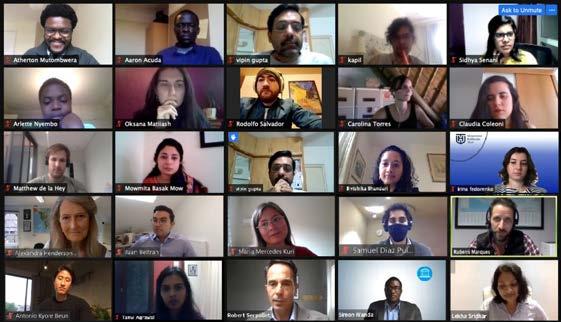
6 INTRODUCTION
Skaljic, has also been pivotal in raising the profile of the Trust, while Minah Faiz upped our game with stunning and memorable instagram posts across the year.
And then we got to the end of the year and, as I said, despite all odds, the full cohort met in person for the Leadership Forum retreat at Cumberland Lodge, located in the lovely surroundings of Windsor Great Park. In addition to intense moral philosophy discussions, we had workshops that helped the students develop their presentation and communication skills, including on-camera coaching. This year, thanks to Rasha Saïd Khawaja and her pioneering Toucan and Lark projects, we also had a workshop with the Globe Theatre and the students excelled themselves at acting out, in little groups, Shakespeare’s Seven Ages of Man.
And in case anyone wonders whether the ongoing pandemic is going to curb our plans for the next cohort, I want to reassure you that it will not. We have already met our thirty-five new students on zoom, and together with the University’s Fees and Funding department, who work tirelessly on our behalf, as well as the visa department, we are addressing the possible obstacles but have assured the incoming cohort that we will do all we can to support their requirements to get here whatever COVID colour their country turns into between now and then.
We will have a new academic adviser, Stephen Wright, from Lincoln, one of our partner colleges, while Nik Kirby, who has guided us with great ideas and good humour over the past six years, takes up a post at Harvard. Daniel Omeiza is picking up the reins from Temitope who has developed our on-line world immeasurably over the past three years and we are on the look-out for the
next person to work with us at WHT looking after the well-being of the scholars and supporting the programme (including sourcing the best brownies) as well as Maggie has done over the last two years, while she goes off travelling.
I don’t think any of us would have got through this year without Jane — everyone, quite rightly, mentions her smile — but for me she has just been a constant presence quite literally keeping the show on the road and we all owe her a huge debt of gratitude.
I look back at this time and am keenly aware that we did not get everything right. The continuing pandemic has affected everyone in different ways. Before the year began, we all had doubts about the feasibility of delivering the Leadership Programme and bringing the cohort to Oxford. However, our scholars made it all worthwhile by rising to the various challenges and giving it their all. I really admire them and wish them every success for the future.
Thank you to all our supporters — our partner, the University and especially Martin Williams who has to deal with our constant requests, college partners, trustees and advisory board members, enterprise challenge coaches and panellists, alums and all the other WHT friends — we very much look forward to seeing you, with a bit of luck, in the flesh before too long!
Have a good and safe summer — above all good luck to the WHT year of 2021 — if ever there was a year to show leadership and compassion, this was it.
Best wishes,
 Alexandra Henderson Director, Weidenfeld-Hoffmann Trust
Alexandra Henderson Director, Weidenfeld-Hoffmann Trust
7 INTRODUCTION

8 TABLE OF CONTENTS End of Year Overview 5 Overview New Partnership 10 Scholarships 11 A Unique Scholarship Programme 12 Colleges Hertford College 14 Keble College 15 Lincoln College 16 Mansfield College 17 St Edmund Hall 18 Trinity College 19 Worcester College 20 Leadership Programme Moral Philosophy Programme 21 The Enterprise Challenge 23 Blavatnik Practical Skills 26 Alumni Impact Alumni Growing Impact 31 Louis Dreyfus Foundation Webinar 32 Call to Climate Action Webinar 34 Alumni Updates 36 WHT Year in Pictures 37 Scholar Cohort 2021-2022 41
From when I was about 14 years old, I dreamt about going to Oxford, and I worked exceedingly hard to achieve this goal. The Weidenfeld-Hoffmann Trust did not just give me the opportunity to achieve my goal, it exceeded my expectations. I say this not only because of the funding, but because of the transformative experience I have had through the Leadership Programme and my interactions with my fellow scholars, who have never failed to inspire me.”

Kai Bridgewater Jamaica, MSc Law and Finance Oxford-Hoffmann, Worcester College
“
NEW PARTNERSHIPS FOR THE LEADERSHIP PROGRAMME



Thenew college partnership scheme was set up to enhance the scholars’ Oxford experience and their contributions to their College communities whilst supporting access to the Leadership Programme through the generosity of individual College donors. In 202021, 30 Scholars were welcomed in to the seven core Colleges.

The generosity of our institutional and individual donors enabled the Leadership Programme to grow. This year we have raised £75k towards the cost of the Leadership Programme including an additional £3000 from our alumni (one of whom supports the Welcome/Farewell Dinner).
Thanks to the generosity of GRoW @ Annenberg, who supported the Leadership Programme for three scholars, the Saïd Business School, who supported another three scholars, and the Blavatnik School of Government who kindly funded the Leadership Programme for five scholars. In addition, the Blavatnik Family Foundation generously supported public speaking and communication training once again. The Trust is committed to continuing to raise funds for the Leadership Programme Endowment Fund.
The Partnership Colleges have committed circa £1.5m over 5 years which was matchfunded by our co-founder and Trustee André Hoffmann and Chairman of the Trustees Michael Lewis to be invested in the Leadership Endowment Fund set up in 2019.



Living together through the ups and downs of eleven months, three academic terms, and a couple of lockdowns, we became a tight-knit college group within the larger WHT cohort. It’s been a privilege to share my Oxford experience with them and I am grateful to Mansfield College for being such a great partner to WHT.”

10 OVERVIEW
Mansfield College St Edmund Hall
Trinity College Worcester College
Keble College Lincoln College Hertford College
Sarani Jayawardena Sri Lanka, MSc in Evidence-Based Social Intervention and Policy Evaluation Oxford-Weidenfeld and Hoffmann-Barnett, Kofi Annan Scholarship, Mansfield College
“
SCHOLARSHIPS
In less than five years thanks to the generosity of our first Chairman and Co-founder André Hoffmann and match funding from our partner the University of Oxford, the Trust raised nearly £30 million for an endowment, which will allow for about 30 graduate scholars per year in perpetuity to accept an offer to study at one of the world’s greatest universities.
The Trust continues to benefit from the generous support of other institutional and individual donors and partners both at Oxford and within the broader WHT network enabling us to support the brightest and best students from developing and emerging economies.


We have been working in partnership with Chevening UK since 2018 who have supported 21 scholars in this time. In 2022 we will mark the 10th Anniversary of our Partnership with the Louis Dreyfus Foundation who will have supported 88 scholars.


This year we agreed a new partnership to support up to 3 Hualan Scholars from China each year.
In my programme we study changes in the environment from very different perspectives. I aspire to take this knowledge and experiences back to my region towards helping to build climate change resilience. I am eternally grateful to the Louis Dreyfus Foundation and the Weidenfeld-Hoffmann Trust for giving me this opportunity.”
Simant Verma India, MSc Environmental Change and Management, Louis Dreyfus-Weidenfeld and Hoffmann Scholar, Worcester College

11 OVERVIEW
“
3 Scholars
24 Oxford-Hoffmann and Oxford-Weidenfeld and Hoffmann Scholars
DIRECT DONOR
3 Scholars
DIRECT DONOR
ENDOWMENT
A UNIQUE GLOBAL
Since 2007, 312 scholars from 89 countries have been awarded scholarships by Weindenfeld-Hoffmann Trust through the benevolence of the 46 different combinations of partners and donors.

30 scholars from 20 countries
79 courses in governance, health, social and environmental sustainability, tech and business
87% reported that the Leadership Programme helped them develop their professional skills
left confident they can develop an enterprise
12 OVERVIEW
67%
SCHOLARSHIP
Thanks to all our donors and partners. 79 different degree types from 14 different course areas have been obtained so far by scholars through the WHT scholarships.

“It made Oxford extraordinary, I was a bit hesitant about how demanding it could become, but there is NO other scholarship in Oxford that focuses so much on equipping us with the tools and skills to be successful after our degree.”
 Samuel Diaz Pulgar Venezuela, Master of Public Policy
Samuel Diaz Pulgar Venezuela, Master of Public Policy


Oxford-Weidenfeld and Hoffmann/Chevening, Lincoln College
Being a WHT scholar is a once-in-a-lifetime opportunity to meet, learn and get inspired by like-minded and motivated individuals. It has also helped my process of healing, as I came into the scholarship with a very difficult and traumatic past behind me. All of us may have different journeys, but our destination is the same — to be the change we want to see! We entered the scholarship in a difficult and unusual year, yet we survived and THRIVED!”
As interesting and enriching as studying at Oxford is, I truly believe half of my overall experience was due to WHT. I met an amazing community of scholars, alums, donors, partners, and staff. Their stories inspire and challenge us to be better, to lead change in our societies and help us realise that with hard work and commitment there are no limits to what we can achieve.”
Andrés Ordoñez-Buitrago Colombia, MSt Diplomatic Studies Oxford-Hoffmann, St Edmund Hall
13 OVERVIEW
“
Nandita Venkatesan India, Master of Public Policy Martin Robinson Scholarship, Keble College
“
HERTFORD COLLEGE
HERTFORD COLLEGE SCHOLARS



from left to right:
Esther Ninshuti (Rwanda, Master of Business Administration), Karan Gupta (India, Bachelor of Civil Law), Reka Kassay-Farkas (Hungary, Master of Business Administration), Analia Saker (Colombia, MSc Water Science, Policy and Management)
What excited me most about my degree is its holistic approach to business education. Rather than just learning the basics of Finance, Marketing or Accounting, I took courses such as Capitalism in Debate, Regenerative and Circular Economy and Global Opportunities and Threats. In the latter course I learnt about systems change and human centred design, concepts that truly transformed my thinking. As a management consultant, I primarily used linear thinking and valued the simplification of tough problems, while this course taught me to accept and tackle the complexities that exist at a system level.”
14 COLLEGES
Réka Kassay-Farkas Hungary, Master of Business Administration Oxford-Weidenfeld and Hoffmann-Saïd/Barnett, Hertford College
“
KEBLE COLLEGE
KEBLE COLLEGE SCHOLARS



from left to right:
As young leaders charting new paths and bringing to life new visions for our countries, I wonder what it means to take a leaf out of Black Feminists’ pages and dare to become caring leaders. What if we move from the investment in being human beings, a category not everyone has benefitted from, to being caring beings. What kinds of societies are we able to foster? This is indeed how we are able to move from being a world in which everything hurts to one in which all life forms thrive.”
15 INTRODUCTION COLLEGES
Valery Otieno (Kenya, MSc Social Science of the Internet), Nicolás Gómez Ospina (Colombia, MSc Law and Finance), Nandita Venkatesan (India, Master of Public Policy)
Valery Otieno Kenya, MSc Social Science of the Internet Oxford-Hoffmann and GRoW @ Annenberg Sloane Robinson Foundation Scholarship, Keble College
“
LINCOLN COLLEGE

LINCOLN COLLEGE SCHOLARS

from left to right:
not in the picture:
My parents have always instilled in me the importance of education as I grew up. I recall my father always saying, “Education is a form of resistance.” As a Palestinian, I remember the days when I used to hold my siblings’ tiny hands and pass the checkpoint to reach to our school in Ramallah at the beginning of the uprising in 2000. This was the reality of a generation that grew up facing restrictions on movement on a daily basis. Those images are still deeply engraved in my memory and they helped me to envisage my aspirations for the future. This is why I chose the International and Comparative Education pathway for my MSc at Oxford University. Before coming to Oxford, I thought about all the educators, teachers, colleagues, and friends, who believed in my ability to showcase the problems faced by educators and students in Palestine, so we can collectively think of evidence-based interventions.”

16 COLLEGES
We’am Hamdan Palestinian Territories MSc Education (Comparative and International Education) Oxford-Weidenfeld and Hoffmann-Sackler, Lincoln College
Fizza Rahman (Pakistan, MSc Economics for Development), We’am Hamdan (Palestinian Territories, MSc Comparative and International Education
Samuel Diaz Pulgar (Venezuela, Master of Public Policy), Prerna Wadikar (India, Master of Business Administration), Bigyan Regmi (Nepal, MSc in Economics for Development)
“
MANSFIELD COLLEGE
MANSFIELD COLLEGE SCHOLARS


from left to right: Xuan Zhu (China, MSc Social Science of the Internet) not in the picture:
Natalia Brigagão (Brazil, Magister Juris), Kessem Adiv (Israel, MSc Refugee and Forced Migration Studies), Soumaya Bélaïd (Tunisia, Master of Public Policy), Mirza Beg (India, Master of Public Policy), Sarani Jayawardena (Sri-Lanka, MSc in EvidenceBased Social Intervention and Policy Evaluation), Alejandro Biondi Rodriguez (Argentina, MSc in Evidence-Based Social Intervention and Policy Evaluation)
Think new things, make new connections. The simple but powerful Ditchley Foundation motto came across clearly during the Take Back Control Conference this June. The focus was on how to recouple an effective division of political authority with an adequate representation of different identities, with the ultimate aim of boosting economic growth and social cohesion in the UK and beyond. In a Ditchley conference, no answers are right or wrong, assumptions are challenged and nothing is taken for granted. In the era of post-truth, fake news and identity politics, engaging deeply with other people’s thoughts, especially when they think differently, has never been more important.”
Alejandro Biondi MSc in Evidence-Based Social Intervention and Policy Evaluation Oxford-Hoffmann, Kofi Annan Scholarship, Mansfield College

17 INTRODUCTION COLLEGES
“
ST EDMUND HALL
ST EDMUND HALL SCHOLARS



from left to right:
Tafadzwa Matika (Zimbabwe, MSc International Health and Tropical Medicine), Melissa Penagos (Colombia, MSc Biodiversity, Conservation and Management), Andrés Ordoñez-Buitrago (Colombia, MSt Diplomatic Studies), Darin Hussein (Palestinian Territories, Master of Public Policy)
The current rates of biodiversity loss are so high that ecologists believe we are reaching the sixth mass extinction on the history of the earth, driven by human action. This not only represents an invaluable loss of nature but also put our future generations in danger, making urgent the need for action. My scholarship allowed me to come to a world-class institution to pursue my degree my MSc in Biodiversity Conservation and Management, and I realised that to be effective, conservation must involve scientific, social and political approaches. I believe that development and environmental protection are compatible, but actions must be taken now.”
18 INTRODUCTION COLLEGES
Melissa Penagos Colombia, MSc Biodiversity, Conservation and Management Julius Baer Scholarship, St Edmund Hall
“
TRINITY COLLEGE
TRINITY COLLEGE SCHOLARS


from left to right:
Tamarie Rocke (Belize, MSc in International Health and Tropical Medicine), Manuel Francisco Azuero (Colombia, Master of Public Policy), Tamar Bortsvadze (Georgia, MSc Evidence Based Social Intervention and Policy Evaluation)
Following this experience, I wouldn’t say I’ve changed but rather come into a more confident, secure, compassionate version of myself. I have a clear idea of how I could leverage this unique experience professionally, yes, but more importantly, I feel a sense of pride and belonging in a well-respected society of individuals who, like myself will change the world for the better. I was equipped to strengthen my message of ethical conduct in the workplace, in research and in any future leadership position I may find myself. WHT has challenged me over a difficult year to still take up space, be seen and most importantly take care of myself and those around me.”

19 COLLEGES
Tamarie Rocke Belize, MSc International and Tropical Medicine Oxford-Hoffmann and GRoW @ Annenberg, Trinity College
“
WORCESTER COLLEGE
WORCESTER COLLEGE SCHOLARS


from left to right:
Simant Verma (India, MSc Environmental Change and Management), Aaron Acuda (Uganda, MSc Water Science, Policy and Management), Maria Mercedes Kuri (Argentina, MSc Water Science, Policy and Management), Kai Bridgewater (Jamaica, MSc Law and Finance)
I came to Oxford with the mindset that I will learn about how to solve water management challenges. Over time, from the several lectures I attended, discussions with friends and professors, and countless readings, I learned that there is no single solution to water problems that I will leave Oxford with as a young water professional. I have been taught to evaluate, compare, and contrast different management solutions and avoid transplanting what works in one place to the other. Or on the other hand, concluding that if one thing does not work in one area, it will not work anywhere else. I have learned more about how to learn. These are a few but some of the greatest lessons that have struck me.”
Aaron Acuda Uganda, MSc Water Science, Policy and Management Louis Dreyfus-Weidenfeld and Hoffmann, Worcester College

20 INTRODUCTION COLLEGES
“
BUILDING THE FOUNDATION FOR ETHICAL LEADERSHIP MORAL PHILOSOPHY PROGRAMME
The cohort of 2021 joined us pre-term for a two-day session of discussions and reflections on political and moral philosophy at the Town Hall. Academic moderators guided scholars through texts from Aristotle to Mandela to consider what constitutes leadership and a ‘good society’, how individuals engage in civic and public life and the tensions that can exist between democracy, equality, justice, personal liberty and collective security, all questions to which they brought their own cultural perspectives.
Follow up seminars, held online whenever meetings were not possible, made the scholars reflect on the Ethics/politics of the Corona Virus, Globalism and Community and Rights and Equality. The final session was part of the retreat at Cumberland Lodge.

Through the Moral Philosophy Seminars, not only do I get to think about some important topics such as brain drains in developing economies, I also get to learn very different perspectives from a culturally and academically diverse cohort. In the end, this process helps me better recognise my own characteristics and identity.”
Xuan Zhu China, MSc Social Science of the Internet Oxford-Weidenfeld and Hoffmann-Lewis Kofi Annan Scholarship, Mansfield College

21 LEADERSHIP PROGRAMME
“
A REFLECTION ON GLOBALISM AND COMMUNITY
Sarani Jayawardena Sri Lanka, MSc in Evidence-Based Social Intervention and Policy Evaluation Oxford-Weidenfeld and Hoffmann-Barnett Kofi Annan Scholarship, Mansfield College
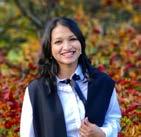
In February, the WHT scholars of 2020-21 participated in our fourth Moral Philosophy Seminar, on Globalism and Community. With a cohort drawing from 20 countries across four continents, now in a single city of learning, this was always going to be an interesting session. We prepared for the seminar by reading two famous reflections on globalisation - Martha Nussbaum’s ‘Patriotism and Cosmopolitanism’ (1994) and David Goodhart’s ‘The Road to Somewhere’ (2017). Though writing about different contexts, Nussbaum and Goodhart pose a similar question: as individuals, do our loyalties lie to the places we are born, or to the world? Are we “somewheres” rooted in the communities of our birth, or “anywheres” dwelling in a global community of humans?
I realised through my own reflections and those voiced by other scholars, that Nussbaum and Goodhart were expressing a question that was in many of our minds. This question determines the political and social currents that shape the world we live in and the things we study; the accession of Donald Trump, Britain’s exit from the European Union, the crises following refugees around the world. It also impacts our personal lives and choices:
is our social responsibility to the places we are born, or to the places we choose? Do we all have an equal opportunity to choose between those modalities — or is that ability pre-determined by the places we call home, the languages we speak, and the colours of our skins?
Many scholars, myself included, felt that we were both rooted in our communities and open to the broader world — we questioned whether this dichotomy between “somewheres” and “anywheres” needed to exist. Yet we also realised that our ability to straddle these lines also stems from privilege — the privilege of being an international student in Oxford; the privilege of part of communities like the WHT; the privilege of feeling like the world is at our fingertips. Our conversation did not result in any concrete conclusions - perhaps the best discussions never do? - but, as with many moments in the WHT, it made me stop, think, and grow. I’m grateful to my fellow scholars, and to our fantastic facilitators Sarah, Paul and Siba, for this experience.
22 LEADERSHIP PROGRAMME
CREATING IMPACT THROUGH ENTERPRISES THE ENTERPRISE CHALLENGE JOURNEY


Fouryears ago, the Trust created the Enterprise Challenge to harness and encourage their new impact business ideas. Seeing how much impact it has had on scholars seeking to cause positive change, we have scaled up our ambitions by inviting more partners and mentors. The WHT Enterprise Challenge is an opportunity for Scholars to put their skills to work to make a positive change in the world through the power of business. Throughout the year, the scholars have benefitted from the expert-led sessions that covered ideation, business model canvas, business plan, pitching skills, enterprise finance, logistics and delivery and pitching. We are excited to support all the teams who made it through the final pitch event at the Leadership Forum and land look forward to their progress.
We thank all our panellists, judges and the mentors: Mohamed Amersi (Chairman, Amersi Foundation), Sarah Barratt Ball (Director of the Creative, Destruction Lab), Alina Barnett (WHT Trustee, Economist, Bank of England), Ben Barnett (WHT Advisory Board Member, CEO TFG Brands (London Limited)), Peter Hands (Entrepreneur, investor, export specialist), Rasha Khawaja (Founder and CEO of The Toucan Ventures), Matthew de la Hey (WHT alumni, Inploi, Cofounder and CEO), Eileen Modral (Investment Manager, Oxford Innovation), Joseph Ssentogo (WHT alumni, Senior Director, Global Innovation Fund)
Winning the £10,000 first prize felt surreal and reflected more of the richness of the training we have received from the WHT Enterprise Challenge: it was an opportunity to apply all the skills that Irina and Atherton taught us in Michaelmas in a very practical way. We are deeply excited to work on this project further and see where it takes us.”
23 LEADERSHIP PROGRAMME
Tafadzwa Matika Zimbabwe, MSc International Health and Tropical Medicine Oxford-Hoffmann and GRoW @ Annenberg Julius Baer Scholarship, St Edmund Hall
“
ENTERPRISE CHALLENGE TEAMS 2021
JEEVA
Bigyan Babu Regmi, Tamar Bortsvadze, Tafadzwa Matika, Aaron Acuda & Prerna Wadikar
Jeeva HPS is a lithium-ion based battery solution purpose designed to address the energy needs of micro entrepreneurs in emerging economies. It is a patent-pending world’s smallest dual charge hybrid power solution which runs multiple devices simultaneously.
 ARCUA Maria Kuri & Melissa Penagos
ARCUA Maria Kuri & Melissa Penagos
Arcua is an enterprise that seeks to ensure conservation of forests and biodiversity while increasing the income of the communities that protect it. Through facilitating the connection between international funds and local land-owners in Colombian forest, Arcua will not only contribute to carbon capture but also species conservation, water and soil protection. We will also enable the sustainable production of forest related products according to the communities’ needs and preferences.

ETÉREO

Analía Saker & Andrés Ordoñez Buitrago
Etéreo aims to produce socially and environmentally sustainable home decor and accessories (initially rugs/ carpets and bags) with environmentally-friendly materials. Our designs will be exclusive, sophisticated, and colorful, inspired by the traditional craftsmanship of Colombia’s indigenous and rural communities. Our highquality and tasteful products will distinctively garnish spaces and give you a unique look, while simultaneously contributing to the empowerment of low-income, women-led communities.
HANDE COURIERS

Taf Matika, Dennis Mazingi & Chido Chigwedere
Hande Couriers is an on-demand, last-mile delivery company that was co-founded by WHT scholar, Taf Matika. By using sustainable transportation and AI, Hande Couriers helps to connect small to medium enterprises in Zimbabwe with their customers in a more affordable, efficient and sustainable way.
SMART ZERO
 Tamarie Rocke, Kai Bridgewater & We’am Hamdan
Tamarie Rocke, Kai Bridgewater & We’am Hamdan
SmartZero is Belize’s first refill subscription service and delivery truck. We sell the following five items: dish soap, detergent, fabric softener, hand soap, multipurpose cleaner. Our concept is mainly aimed at middle and low-income consumers, offering sustainable and affordable alternatives to products on the current market. SmartZero allows ease of access to essentials, cutting cost of travel and reducing plastic prepackaging waste.
CAREERLAB


Réka Kassay-Farkas, Esther Ninshuti, Nicolás Ospina, Nandita Venkatesan & Karan Gupta
CareerLab is a website and platform that provides high quality career counselling services for high school students in the UK and beyond. Our students will embark on a holistic, personalised and continuous career exploration journey were filling out a pathfinder survey is only the first step of the exploration process. They will have the chance to browse high quality, curated educational content on different career paths, have 1-on-1 conversations with career coaches and industry experts, engage in fun, gamified experiences that show them what it is like to be in the life of a professionals, track their progress and continuously re-evaluate their direction based on what they learn on the website.
NUTRIENDO EL FUTURO (NEF)

Samuel Pulgar
NEF is a project started on February 5, 2018 by young Venezuelans who, concerned about the socioeconomic situation and the future of Venezuela, decided to contribute to the community of Calvario Alto (Municipality of El Hatillo) through the creation of a community dining room and, consequently, through the creation of a non-profit Civil Association, which contributes to its empowerment, through training and education activities, and the recovery of community spaces.
BUZZTOP
Valery Otieno & Jean Salesi
At BuzzTop, we bring together everything required to shed light on transit networks in Africa. Using data and technology, we aim to power the future of movement in Africa through our fully integrated suite of products putting buses on the map. Our products reinforce one another, spurring new interactions that give us the ability to infer the whereabouts of buses in a historically opaque network. Overall, we want to optimize movement and spark economic growth by building a platform that empowers commuters, transport operators and businesses to cut the guesswork and move more confidently across African cities.
24 LEADERSHIP PROGRAMME
ENTREPRENEURS ARE PROBLEM SOLVERS
Esther Ninshuti Rwanda, Master of Business Administration Oxford-Weidenfeld and Hoffmann-Saïd/Lewis, Hertford College

In the few months I’ve been here at Oxford, I feel like I’ve experienced 5 years’ worth of experiences. Every day I interact with diverse sets of people, engage in a variety of conversations about topics I’m passionate about, so much that my viewpoints evolve almost daily. Someone recently asked me the last time I changed my mind and after thinking about it I realized that coming to Oxford has led me to be more open-minded than I thought I was, and being open to challenge is the only way I will be able to get the most out of this short year.
I can give an example of this process of continuous evolution. I had always viewed entrepreneurship simply as starting your own business. And as something that I was generally apprehensive about, I had decided that entrepreneurship was not really for me. Yet, I applied for the MBA because I wanted to be better equipped to tackle the challenges that I see in my community and implement solutions that actually positively impact people’s lives. Through my degree and the WHT Enterprise Challenge, I have realized that to tackle these world scale problems, I do need an entrepreneurial mindset. This may not necessarily mean ideating and executing a business – it means being able to approach any problem and learning to understand it fully along with its root causes and determining
the most efficient way to solve the issue. I’m learning to think in terms of systems and not just singularly.
As an engineer, I was trained to solve problems linearly. Now I’m being exposed to a more global understanding of issues and systems. I can now better determine what to prioritize in order to chip away at the problem I want to solve. I saw this manifested recently in a documentary I watched called Bending the Arc, that follows the journey of a group of people as they patiently worked to improve public health systems in economically exploited countries. The dedication and follow-through it took to question the statusquo and attack the problem from all angles is something that inspired me to think bigger when tackling issues I’m passionate about.
Understanding systems holistically is a skill I am excited to practice as part of the Impact Lab and Map the System, programs offered by the Skoll Foundation. One of the most exciting parts about this year is that I get to practice these skills within the bubble of academia – where there are safety nets, and I can sharpen my skills. This will prepare me to apply these skills in any setting I find myself in where I am needed to tackle nuanced and integrated problems faced by my community.
25 LEADERSHIP PROGRAMME
PREPARING A TOOLSET FOR PROFESSIONAL EXCELLENCE BLAVATNIK PRACTICAL SKILLS
Throughout the year scholars get the practical skills needed to make a difference in their chosen careers particularly how to communicate effectively and with impact. Sessions included storytelling, writing for social media and the web, pitching, presenting, and the day-long ‘Communicating Impact coaching on camera session at the Leadership Forum.
This year, thanks to Rasha Saïd Khawaja and her pioneering Toucan and Lark projects, we also had a story-telling workshop with the Globe Theatre which provided tips in preparing for presentations and how to feel confident in the room wherever you find yourself.
Enterprise Challenge Pitch to Business Leaders

Interview Skills
On-camera Training for Public Speaking
AGL (Communciation Coaching) was amazing! I personally had a breakthrough in communication struggles I have had for a while. The best part of the Leadership Program for me.”

26 LEADERSHIP PROGRAMME
Natalia Brigagão Carvalho Brazil, Magister Juris, Oxford-Weidenfeld and Hoffmann, Kofi Annan Scholar, Mansfield College
“
SHOWING LEADERSHIP AND BUILDING COMMUNITY
We provide as many opportunities as possible and encourage the scholars to test the skills and knowledge learnt. The WHT Annual Debate 2021, held in the Oxford Union’s debating chamber, chaired by Tom Fletcher, Principal of Hertford College, was: ‘This House believes that social media platforms have a right to ban politicians’. It was a very topical debate, organised in all parts by the scholars.
Three WHT scholars were invited to join conferences held at Ditchley and pitch their thoughts to the high level delegates (Prerna Wadikar, Alejandro Biondi Rodriguez, and Oksana Matiyash).

In addition to these formal events, other scholars displayed leadership by encouraging community get togethers. Tamarie Rocke organised a well-attended quiz show, Kessem Adiv and Bigyan Regmi a series of presentations by scholars
Scholar Karan Gupta with The Oxford Union President, Adam Roble for scholars about their professional and academic work, Melissa Penagos and Darin Hussein created opportunities for scholars to meet outdoors throughout the lockdown period.

27 INTRODUCTION LEADERSHIP PROGRAMME
DEBATING CELEBRATES HUMANITY
Manuel Francisco Azuero Colombia, Master of Public Policy Oxford-Weidenfeld and Hoffmann-Abraham/Rausing, Trinity College

There are many reasons to celebrate debating. But among them, there are three that really make me passionate. Let me elaborate further.
THE CONVENING POWER OF DEBATES
A debate is of course, at the very least, a meeting of two. In a world profoundly fragmented, often affected by prejudices that fuel segregation and hate amongst communities (very frequently amongst people that don’t even know each other), the ability to bring people together is very powerful and much needed. It reveals a fundamental fact that is frequently ignored: we all have something in common, and when “in common” I don’t mean something that we agree on. No. I am referring to something that we inherently share, a concern, a question, a collective element – whatever form it takes – that reflects a piece of our common humanity.
Hence, even when the apparent goal of debating is to confront opposing claims, a genuine debate humanizes the confrontation. And in that sense, I believe that a debate works as a source of empathy and as an antidote against violence. An extraordinary human invention to experience in peace the forest of our differences and thrive. In fact, the other remarkable capability of debating is precisely congregating people that hold different views. That takes us to the next factor.
ACKNOWLEDGING, ACCEPTING, AND ENGAGING WITH DIVERSITY
Our thoughts, our feelings, our beliefs, our values, our arguments, are diverse. We debate because we recognize that we are not
a monolith. An authentic debate is based on the premise that, within human communities, different views, positions, opinions should be admitted and acknowledged. Through history debating has been frequently used as an exclusionary mechanism, a conversation between rather similar people that has marginalized and oppressed others. A debate can only be true to itself if it is open to human diversity. This is not to say that debating is simply an exhibition of diversity. It goes beyond mere appreciation. It is a dialectic and active confrontation of differences. Not for domination nor for subjugation, but for collective reflection.
DEBATES FOSTER REFLECTION AMONG THE DEBATERS AND THE AUDIENCE
Regardless of the distinct strength of the arguments of one side or the other and despite the stated objective to “win” the argument, the idea of debating is built upon the recognition of our intrinsic fallibility. Debating is a critical inquiry of humans’ viewpoints and a powerful rejection of perfection. It allows us to address the fallibility of the ‘opposing’ views but also, if the spirit of the exercise is fully embraced, the fallibility of our own, because we are forced to reflect on the consistency and coherence of our positions. As Timothy Garton Ash wrote in the Free Speech Debate project of St Antony’s College, “we cannot get at the truth unless we are exposed to the relevant facts, opinion and arguments. Even false ones may contain a silver of truth or provoke us to clarify our own as we respond to them”.
28 INTRODUCTION 28 LEADERSHIP PROGRAMME
THREE NUGGETS OF LEADERSHIP
Mirza Beg India, Master of Public Policy Oxford-Hoffmann, Kofi Annan Scholarship, Mansfield College

After coping with uncertainty this entire year, the Leadership forum gave us a few days to undertake new challenges and reflect. This year has shown us how difficult situations call for effective leadership – leadership that can instil hope and forge new possibilities. This requires a very specific kind of mindset and that is exactly what the Leadership Forum has given each participant. I’d like to share some of the non-academic, interpersonal skills I learned from my fellow participants.
LISTENING WITH INTENTION AND EMPATHY
As we get older, we tend to lose childlike curiosity. It becomes clear that it is inappropriate to ask all the questions that come to mind, and we become guarded. Consequently, we engage in surface-level conversations, rarely digging more in-depth. During the leadership program we learnt how it is essential to listen with care and engage yourself actively with empathy. In one session, we were split into pairs, and we expressed moments from our lives that brought us most happiness. We then proceeded to share this experience with another person. In doing so, we were trained to actively listen, without any judgment, and be expansively mindful.
HOLDING CRITICAL CONVERSATIONS
As an evolutionary defence mechanise, our mind is hard-wired to consider the nearest outcomes of a given situation, and more importantly, to seek shortcuts to arriving at the outcome with minimal risk. Giving in to this approach makes one comfortable and growth takes longer within these comfort zones. We
stick to our biases because we do not take the risk of uncomfortable situations. The leadership training at WHT’s Leadership forum provided us with a framework to mitigate our confirmation biases and dive deep into the evaluation of a situation. We were shown how to ask questions that are succinct, clear and, most importantly, how to move away from scripted/formulaic questions and rather ask questions in the moment.
GIVING AND RECEIVING FEEDBACK
Constructive criticism can boost learning, and bad criticism can be detrimental. It is important to build trust so that the feedback is not taken as an attack on someone’s ability. During one simulation session, we were divided into groups, asked to elect a leader, and follow their strategy to complete a certain task. When the groups were done, we were asked to provide feedback to our leader and share our experience with the group. What I observed here was that success lies in being specific with clear, actionable points. Our group leader was able to create a clear plan, through consensus, and execute it by distributing the labour efficiently.
Receiving feedback is not easy and it is not sufficient to package it like a ‘compliment sandwich’ with the feedback stuffed in between. One must endeavour to check their motives before giving feedback and ensure that you suggest concrete step for improvement. This helps the group build on its successes, develop trust and comfort while the sandwiches can be left for lunch.
29 LEADERSHIP PROGRAMME
As an environmental engineer I decided long ago that I wanted to dedicate my life to protecting the water resources of the planet. This is why I want to thank the Weidenfeld-Hoffmann Trust and the Louis Dreyfus Foundation for supporting me in this path and for giving me the extraordinary opportunity to study at the University of Oxford.”

Maria Mercedes Kuri Argentina MSc Water Science, Policy and Management Louis Dreyfus-Weidenfeld and Hoffmann Worcester College
“
ALUMNI GROWING IMPACT

LIVING THE LEADERSHIP PROGRAMME VALUES – MAKING A VISIBLE DIFFERENCE
312alums from 79 countries have benefited from the Leadership Programme to tackle major problems in their countries and regions of origin or from within multilateral organisations. Many of them have shared their experiences with us in the WHT Alumni Webinar Series, from establishing a small coffee business in Vietnam to evaluating investments for multilateral development banks in Saudi Arabia, from mitigating human-nature conflicts in Namibia to resolving human conflicts in Ethiopia and Afghanistan, from developing water and sanitation services to prevent cholera outbreaks in Zimbabwe, to fighting a full-blown COVID pandemic in South Africa.
The biggest tragedy for a nation is when there is an abundance of brilliant minds but limited opportunities. This is the truth for many developing nations. It gives me such happiness to be a part of a Trust that is fiercely dedicated to bridging that gap and training leaders! WHT did not just give us the means to gain an education at Oxford but it provided us with a community of young like minded leaders across the world who we now call family, and guidance from the wonder team and board that leads the Trust!”

31 ALUMNI IMPACT
Gurmehar Kaur India, 2020 OxfordWeidenfeld and Hoffmann-Rosner Global ambassador for Digital Peace Now
“ 19% 25% 17% 14% 8% 17% Africa Eastern Asia Eastern Europe Latin America North America Western Asia WHERE DO OUR ALUMS COME FROM? 25% 17% 8% Africa Eastern Asia Eastern Europe Latin America North America Western Asia
Pablo (left), 2020 scholar from Argentina, meets Alejandro (right), 2021 scholar from Argentina, at the Leadership Forum.
In partnership with
LOUIS DREYFUS FOUNDATION SUSTAINABILITY WEBINAR: A GLIMPSE INTO THE FUTURE OF FOOD SECURITY

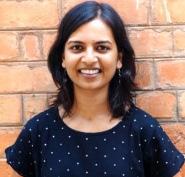

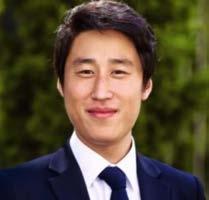
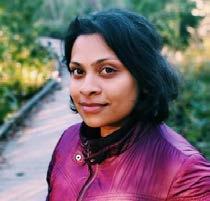
The webinar, which featured many Louis-Dreyfus Weidenfeld-Hoffmann alums, served as a platform to share the inspiring work WHT alumni are doing to help small farmers around the world. It was also a chance for alums and LDF to hear and learn from one another. Two of the alumni who participated offer some reflections.
PANEL 1: BIG MEETS SMALL: HOW CAN CENTRAL BANKS, CENTRAL GOVERNMENTS, AND NGOS SUPPORT SMALL SCALE FARMERS AND COMMUNITIES?
NATURE AND SOCIETY SHOULD NOT BE AT ODDS
Research and technological advances now show that nature and society do not have to be at odds — agroforestry and nature-based solutions can not only reduce carbon emissions, but can also sequester carbon. In addition, as more corporations commit to climate targets and ‘no deforestation’ pledges, there is also strong motivation within the land use sector to make these solutions mainstream. However, the challenge is twofold, (a) making these techniques economically viable for smallholders through financial inclusion and long-term market access, and (b) ensuring traceability in the supply chain to build credibility among corporations and consumers. Both these issues are connected: how can we trace emissions to the source, so that farmers can be incentivised to adopt climate friendly practices, and corporations are able to provide credible information to their consumers that their products meet environmental goals?”

ALUMNI IMPACT
Lekha Sridhar India, 2014 Louis Dreyfus – Chevening Senior Policy Analyst, WattTime
“ 32
Antonio Beun, Argentina Delivery Associates, Mexico
Tanvi Agrawal, India Ashoka Trust for Research in Ecology and the Environment, India
Leanne (Siying) Zhang, Hong Kong, Central Bank in Hong Kong
PANEL 2: TRANSFORMATIVE EDUCATION: HOW CAN EDUCATION STRENGTHEN THE CITIZENSHIP OF RURAL OR DEVELOPING COMMUNITIES?
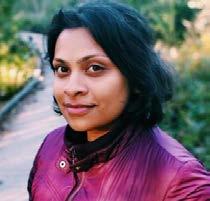
CHOOSING AND FINANCING SHORT-TERM AND LONG-TERM GOALS

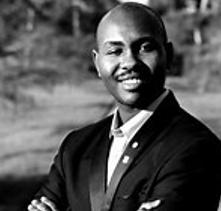

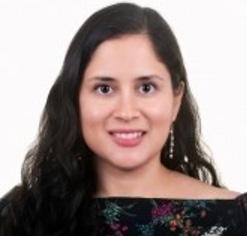
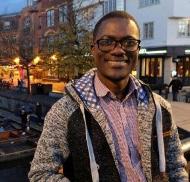

Si Ying stressed the importance of being financially inclusive from a central bank standpoint, given that small farmers tend to fall outside the formal banking system. Tanvi underlined the importance of tailoring NGOs’ policy design to ground-reality, instead of oversimplified templates used by funding structures based on universal and de-contextualised concepts. From a public sector perspective, we argued that many governments are under huge financial stress and their agenda combines challenges of the past –which are still unresolved– and new, emerging challenges. We put COVID-19 as an example of how it has compounded rural development problems that were quite pressing before the pandemic. We explained the importance of helping governments to prioritize in light of such an ever-expanding set of important issues. Because otherwise, governments tend to take the path of least resistance: embracing everything at the same time with little results.
Due to climate change, what is at stake for small farmers in the coming decade is tremendous. While there are no easy answers to what is ahead, one certainty is that creating a group of people with different skills will help us build comprehensive and creative foundations to tackle new challenges. My key reflection after the webinar is precisely that. A diverse group of people is always better equipped to tackle new and uncertain challenges.”

ALUMNI IMPACT
Antonio Beun Argentina, 2019, Louis Dreyfus-Weidenfeld and Hoffmann Delivery Leader, Delivery Associates, Mexico
“ 33
Simon Wanda, Kenya UNESCO, France
Maria Barron, Peru, World Bank Group’s Education Global Practice
Sidhya Senani, India
The VITS School in Satna
PANEL 3: NATURE AND SOCIETY: HOW DO WE IMPROVE THE RELATIONSHIP BETWEEN THE DIFFERENT PARTS OF SOCIETY AND SOCIETY AND NATURE?
Lekha Sridhar, India, WattTime (Environmental Tech NGO)
Cedric Maforimbo, Zimbabwe School of Wildlife Conservation (SOWC), African Leadership University in Rwanda
Dr Juan Beltran, Colombia ECOM Trading (Agroindustrial global commodity trading)
CALL TO CLIMATE ACTION WEBINAR: WHAT WILL MATTER MOST IN THE NEXT 5 YEARS?
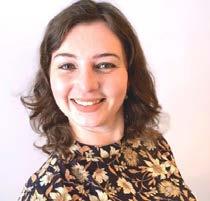

Climatechange affects all of us in profoundly different ways. Many of the 300+ alums in the Weidenfeld-Hoffmann Trust network are at the forefront in the fight against poverty, climate change and biodiversity loss, through their work in governmental and non-governmental organisations, by leading social, transformative, and empowering enterprises. In our first Annual Climate Action Webinar, led by invited speakers Irina Fedorenko and Cvete Koneska, joined by Co-Founder André Hoffmann, scholars were invited to contribute to one of the most important conversations of our time.
A BETTER WAY TO USE LAND AND WATER
WHT scholars understand the intricate connections between forest ecosystems, coastal ecosystems, and human food systems. The preservation (and healing) of these systems, within a framework of balance and mutual aid, needs to be at the top of the agenda for governments and for business and enterprise and this can be supported in many tangible ways:
Investments in Smart Agriculture to increase the productivity of land, reduce waste, and favour natural fertilisers and pesticides.
Promotion of Urban Gardens and Allotments both to reduce carbon emissions due to food transportation, and to make our cities more permeable to nature by supporting, for example, migration routes.
Active Reforestation Campaigns starting with the key species, such as mangroves, that can anchor the regeneration of flora and fauna.
Crowdfunding and Networking platforms to connect climate activists with each other, and to investors interested in direct action.



We believe in the butterfly effect and in the power of the small. We work with communities around the world and find eco-heroes, who restore mangrove ecosystems and match them with investors. This coupled with innovative monitoring from drones and satellites enables great positive impact on climate and people.”

ALUMNI IMPACT
“
Irina Fedorenko Russia, 2016 Hoffmann Scholar Co-Founder, Vlinder Climate
34
The scale of emissions fall disproportionately higher among the few rich countries and fossil fuel companies, so the responsibility to address the negative impacts should also rest disproportionately in those very hands. However, I think that the current ‘shared accountability’ narrative to address the impacts of climate change, have failed to do so. It has overburdened smaller economies, like my home country Nepal, with nominal emissions, who struggle to meet basic developmental needs.”
Bivishika Bhandari
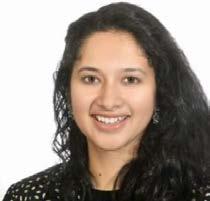
Nepal, 2020 Louis Dreyfus-Weidenfeld and Hoffmann Intern, Louis Dreyfus Foundation
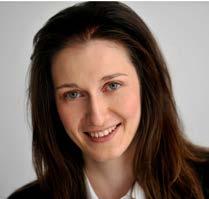
Sustainable Development Goal 13, one of 17 Sustainable Development Goals established by the United Nations in 2015, is about climate action. The official wording is to “Take urgent action to combat climate change and its impacts”.
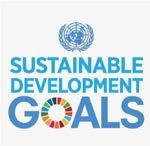

MARKETS THAT FOSTER SUSTAINABILITY BY DESIGN
WHT Scholars offer a radical change of perspective and believe that we should aim at creating commercial markets that solve the problem by design, with a mix of tried and tested and original ideas:
Mandates for Corporations to Identify their Impact on the environment to increase transparency and trust and avoid the offloading of the carbon footprint from the developed to the developing world.’

Research–driven Tools for Green Investors to provide customised impact assessments and provide financial grounding to investment decisions that benefit the environment.
Sustainable Intensification to integrate, through innovation, agricultural productivity and positive social and environmental impacts.
Journalism and Reporting to give a voice to small communities which are negatively affected by national and international interests, even when those interests are green, to keep powers in check so that the green transition is a just transition.
Investors already use a lot of research in deciding how to invest. A lot of that is financial data, but over the past few years there has been a substantial growth in the use of alternative, non-financial data. We need to translate all that we that we know about climate-related research into something that investors can use.”




ALUMNI IMPACT
“
Cvete Konesca Macedonia, 2011 Weidenfeld Scholar Head of ESG Research, Arabesque
35
“
ALUMNI UPDATES
Martina Lejtreger Uruguay, 2020 Oxford-Hoffmann
Martina
is leveraging her 5+ years of professional experience and the interdisciplinary knowledge and skills gained in Oxford’s MPP to advise OECD’s Development Centre in steering policy dialogues with Latin America and the Caribbean to build back better after the COVID-19 crisis, through renewed international partnerships. Thanks to the skills gained through WHT’s Social Enterprise Challenge and the strong network created with female Latin-American MPPs and WHT scholars, Martina is leading the creation of a regional platform aimed at promoting gender equality in Latin America’s workforce.
 Bhanu Prasad India, 2019 Oxford-Hoffmann
Bhanu Prasad India, 2019 Oxford-Hoffmann

Bhanuworks at one of the first Open Social Innovation center in India that incubates young social enterprises. Over the last 5 years they have had 12 sustainable social enterprises that addresses complex challenges across maternal health, tuberculosis, education, disabilities, agriculture etc. Bhanu says: “My experience with moral philosophy seminars reiterated the values that are indispensable in my field and have been extremely helpful. Aspects of leadership communication and positioning have all been valuable skills.”
Scherezade Tarar Pakistan, 2018 Weidenfeld-Hoffmann

Scherezade recently co-authored a book and sent us a dedicated copy. Scherezade is the General Manager of the Research & Development department at Beaconhouse School System, one of Pakistan’s largest school networks. The book, an investigation of Pakistan’s educational landscape, outlines how successive governments have tried multiple reforms but the gap between formulation and implementation is ever-widening

Laura Aristizabal Colombia, 2019 Louis DreyfusWeidenfeld and Hoffmann
Laura has started two social enterprises, @jobtips_ and ProTalento, two rapidly growing platforms which are helping youth from Latin America to obtain better employment. In 6 months, they have helped more than 500 hundred people find jobs in all industries and are training and reskilling more than 150 people to get into tech careers.

36 ALUMNI IMPACT




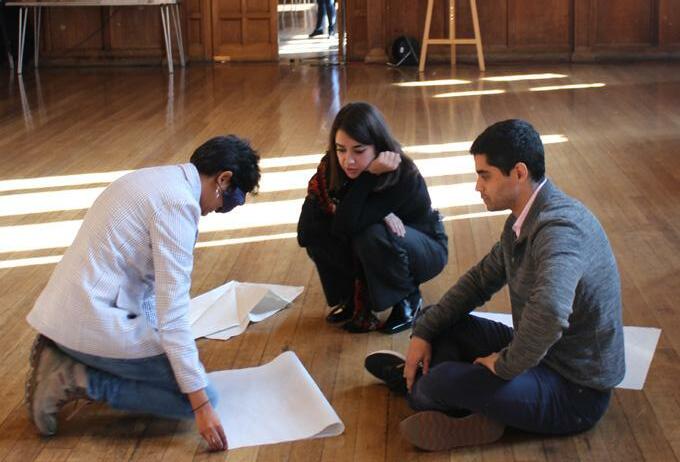

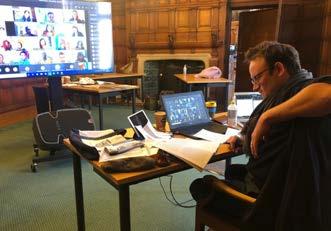


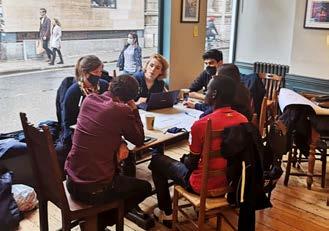

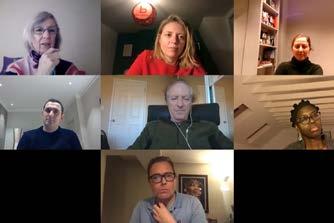
37 INTRODUCTION WHT YEAR IN PICTURES LEADERSHIP PROGRAMME: 2020 - 2021 IN PICTURES Introduction... Moral Philosophy Seminars... Enterprise Challenge... The cohort... The moderators... Matriculation
Working up projects
Louis Dreyfus Alumni Webinar Business Panel in December
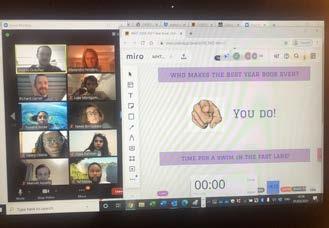





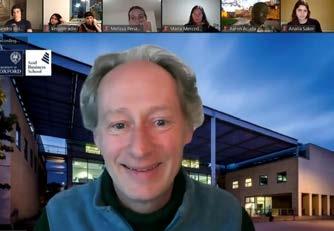



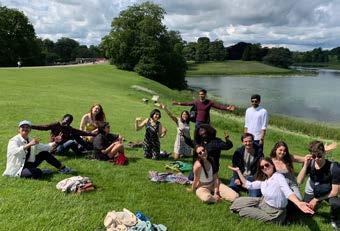
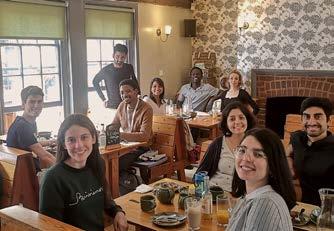

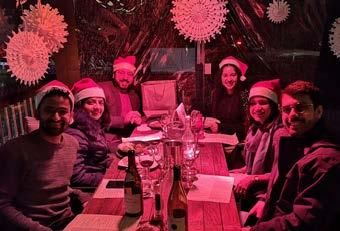

38 WHT YEAR IN PICTURES
Alum Saadia Gardezi Creative Communication
Socially-distanced Christmas GRoW @ Annenberg donor zoom
Lockdown ideas
Prof. Thomas Hellmann ‘Entrepreneurial Finances’
Spring 2021... Brownies ...punting... ...cherry blossom What to debate? ‘This House believes that social media platforms have a right to ban politicians’ Discussing Globalism & Community - ‘somewheres and anywheres’ Unlocking at Blenheim Palace... ...and at the Nosebag










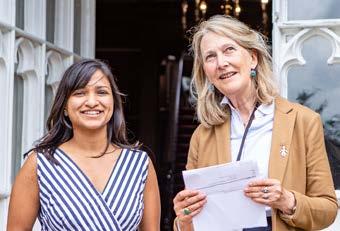

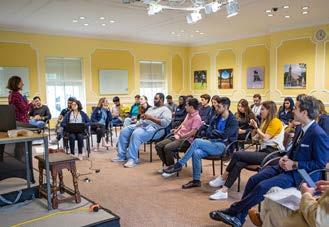
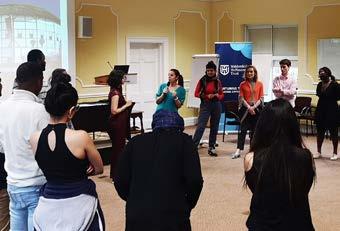

39 INTRODUCTION WHT YEAR IN PICTURES
Cumberland Lodge: Moral Philosophy Globe Theatre Workshop
Alum Shabana Basij-Rasikh, on Girls’ Education in Afghanistan
Alumni give career advice
Manuel Azuero pitching to be a mayor
Belated birthday celebrations for Jane
Oxford-Weidenfeld and HoffmannAbraham/Rausing Scholars
Oxford-Weidenfeld and Hoffmann-Barnett Scholars
Louis Dreyfus Scholars
Oxford-Weidenfeld and Chevening Scholars
Oxford-Weidenfeld and Hoffmann GRoW @ Annenberg Scholars
Oxford-Weidenfeld and Hoffmann/Lewis Scholars
Scholar Awards for Leadership, Mentorship and WHT ethos



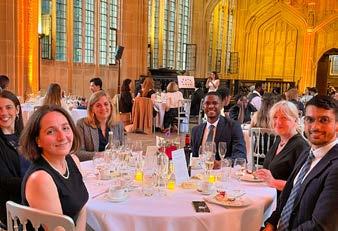



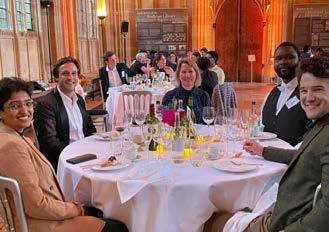


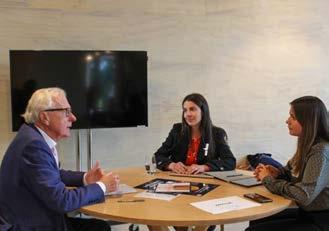



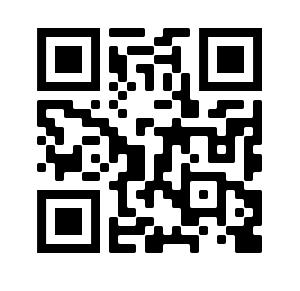
40 WHT YEAR IN PICTURES
Illustrating an enterprise project Peter Hands gives feedback... ...as does Rasha Khawaja
Aaron Acuda thanking the business panel
Farewell dinner, Divinity School
Alum Joseph Ssentongo welcomes our guests
Guests and supporters...
Nandita Venkatesan rounds off the evening with a traditional Indian dance
2020-2021 Yearbook
Scan this code for WHT Scholar playlist & images
WE ARE GRATEFUL TO THE FOLLOWING FOR THEIR SUPPORT FOR THE WORK OF THE TRUST
TRUSTEES
• Mr André Hoffmann
Mr Michael Lewis (Chairman)
Dr Alina Barnett
ADVISORY BOARD MEMBERS
Mr Eric Abraham
Mr Ben Barnett
Sir Andrew Dilnot
Ms Pamela Dow
Mr Justin Gayner
Mrs Margarita Louis-Dreyfus
Dr Precious Lunga
Sir Trevor McDonald
• Lady Elizabeth Roberts
• Dame Theresa Sackler
• Mr Robert Serpollet
• Ms Nadja Skaljic
• Mr Karl Yin
ACADEMIC ADVISER
• Dr Nik Kirby (& Moral Philosophy Seminar Co-Director)
MORAL PHILOSOPHY SEMINAR MODERATORS
• Dr Alice Baderin
• Assoc Prof Sarah von Billerbeck (Co-Director)
• Dr Siba Harb
Prof Jeremy Jennings
Dr Matthew Johnson
Dr Sabrina Martin
Dr Diana Popescu
Dr Paul Sagar
Dr Stephen Wright
COMMUNICATION PRACTICAL SKILLS
Mr Jon Bernstein
Ms Saadia Gardezi
Mr Phillip Brooks
Ms Jennifer MacDonald & AGL Team
ENTERPRISE CHALLENGE TUTOR
Mr Atherton Mutombwera
ENTERPRISE CHALLENGE MENTORS & PANELS
Mr Naman Ahluwalia
Mr Ben Barnett
Ms Carla Villamar
Mr Charlie Curtis
Dr Lauren Fletcher
Mr Justin Gayner
Mr Matthew De La Hey
Mrs Eileen Modral
Mr Andrew Nott
Mrs Rosie O’Malley
Mr Jordan Schlipf
Mr Joseph Ssentongo
Ms Carolina Torres
Mr Meir Wachs
Ms Wen-Yu Weng
SPECIAL THANKS
Prof Emily Jones
Prof Thomas Hellmann
The Globe Theatre
The Toucan Project
LEADERSHIP FORUM: ALUMNI PANEL 2021
Mr Naman Ahluwalia
Mr Usuta Kavari
Mr Pablo Marzocca
Ms Simonetta Spavieri
Ms Andrea Terminal
OXFORD SCHOLARSHIP ENDOWMENT SELECTION PANEL 2021
Prof Jocelyn Alexander
Dr Proochista Ariana
Prof Pepper Culpepper
Dr Peter Drobac
Prof Louise Fawcett
Prof Roger Goodman
Prof Cameron Hepburn
Prof Martin Williams (Chair)
41
•
•
•
•
•
•
•
•
•
•
•
•
•
•
•
•
•
•
•
•
•
•
•
•
•
•
•
•
•
•
•
•
•
•
•
•
•
•
•
•
•
•
•
•
•
•
•
•
•
•
•
•
•
We asked our scholars to go back to the moment they packed their luggage in preparation for their journey to Oxford. But instead of clothes and books, we asked them to think about the stories, people, memories, hopes, and all immaterial things that they would put inside. Find other stories in this series on whtrust.org/blog
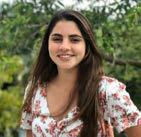
Iappliedto Oxford while working in water and sanitation provision for Venezuelan migrants informally settled in the semi-desertic region of La Guajira in northern Colombia. It seemed unreal, almost ridiculous, the thought of studying at Oxford. During the day, I was surrounded by extreme poverty, malnutrition, and psychological distress. During the night, I wrote essays, translated documents, and studied for the English Language examination. I felt guilty; I thought I did not deserve the comfortable life I had and the dreams I pursued. Because of that experience, I understood that our current economic system does not work anymore; it has failed the migrants of La Guajira and many others like them around the world. Even though there is enough wealth to satisfy humanity’s basic needs, it is concentrated in
the hands of a few people, leading to an extremely unequal society.
Now that I am here, I cannot forget what I experienced. I brought that burden from Colombia, the burden that I need to do something to change that shameful reality. A reality that many of us, the fortunate ones, fail to see because we are too worried about creating more wealth for ourselves, a reality sometimes we choose to ignore. Today, I realize that I have come to Oxford for the people I left in La Guajira, people lacking the most basic needs required for human dignity, and people we cannot keep on failing. They rely on me, and they are my true inspiration to be here.

4242
Analia Saker Colombia, MSc Water Science, Policy and Management Oxford-Hoffmann, Hertford College
I CAME TO OXFORD FOR THE MIGRANTS OF LA GUAJIRA ANALIA’S BAGGAGE TO OXFORD
SCHOLAR COHORT 2020-2021
LOUIS DREYFUS-WEIDENFELD AND HOFFMANN SCHOLARS
• Aaron Acuda, Uganda, MSc Water Science, Policy and Management
• Maria Mercedes Kuri, Argentina, MSc Water Science, Policy and Management
• Simant Verma, India, MSc Environmental Change and Management
OXFORD-WEIDENFELD AND HOFFMANNBARNETT SCHOLARS
• Sarani Jayawardena, Sri Lanka, MSc EvidenceBased Social Intervention and Policy Evaluation
OXFORD-WEIDENFELD AND HOFFMANN-SAÏD/ BARNETT SCHOLARS
• Reka Kassay-Farkas, Hungary, Master of Business Administration
OXFORD-WEIDENFELD AND HOFFMANN-SAÏD SCHOLARS
• Prerna Wadikar, India, Master of Business Administration
OXFORD-WEIDENFELD AND HOFFMANN-SAÏD/ LEWIS SCHOLARS
• Esther Ninshuti, Rwanda, Master of Business Administration
OXFORD-WEIDENFELD AND HOFFMANNABRAHAM/RAUSING SCHOLARS
• Kessem Adiv, Israel, MSc Refugee and Forced Migration
• Manuel Azuero, Colombia, Master of Public Policy
• Soumaya Bélaïd, Tunisia, Master of Public Policy
OXFORD- WEIDENFELD AND HOFFMANNLEWIS SCHOLARS
• Kai Bridgewater, Jamaica, MSc Law and Finance
• Xuan Zhu, China, MSc Social Sciences of the Internet
OXFORD-WEIDENFELD AND HOFFMANN SCHOLARS
• Natalia Brigagão Carvalho, Brazil, Magister Juris
• Fizza Rahman, Pakistan, MSc in Economics for Development
OXFORD-HOFFMANN SCHOLARS
• Mirza Saaib Beg, India, Master of Public Policy
• Alejandro Biondi Rodriguez, Argentina, MSc Evidence-Based Social Intervention & Policy Evaluation
• Tamar Bortsvadze, Georgia, MSc EvidenceBased Social Intervention & Policy Evaluation
• Nicolas Gomez Ospina, Colombia, MSc Law & Finance
• Karan Gupta, India, Bachelor of Civil Law
• Andrés Ordoñez-Buitrago, Colombia, MSt Diplomatic Studies
• Melissa Penagos, Colombia, MSc Biodiversity, Conservation & Management
• Bigyan Regmi, Nepal, MSc Migration Studies
• Tamarie Rocke, Belize, MSc International Health & Tropical Medicine
• Analia Saker, Colombia, MSc Water Science, Policy and Management
OXFORD- WEIDENFELD AND HOFFMANNSACKLER SCHOLARS
• We’Am Hamdan, Palestinian Territories, MSc Education (Comp and Int Ed)
OXFORD-WEIDENFELD AND HOFFMANN/ CHEVENING SCHOLARS
• Darin Hussein, Palestinian Territories, Master of Public Policy
• Nandita Venkatesan, India, Master of Public Policy
• Samuel Pulgar, Venezuela, Master of Public Policy
OXFORD-HOFFMANN AND GROW @ ANNENBERG SCHOLARS
• Valery Atieno, Kenya, MSc Social Sciences of the Internet
• Tafadzwa Matika, Zimbabwe, MSc International Health Tropical Medicine
43
SCHOLAR COHORT 2021-2022
HUALAN-WEIDENFELD AND HOFFMANN SCHOLARS
• Yifan Ping, China, MSc Education (Comparative and International Education)
LOUIS DREYFUS-WEIDENFELD AND HOFFMANN SCHOLARS
• Ayan Kanhai Aman, India, MSc Nature, Society and Environmental Governance
• Katherine Polkinghorne, South Africa, MSc Sustainability, Enterprise and the Environment
• Faith Atieno Odero, Kenya, MSc Water Science, Policy and Management
OXFORD-HOFFMANN SCHOLARS
• Nalin Singh, South Africa, MSc Water Science, Policy and Management
• Zahid Shashoto, Bangladesh, MSc Environmental Change and Management
• Micaela Flores Lanza, Bolivia, MSc Energy Systems
• Adriana Oseguera Gamba, Mexico, MSc Comparative Social Policy
• Ankita Nawalakha, India, Master of Public Policy
• Lucía Artavia Guzmán, Costa Rica, MSc
Biodiversity, Conservation and Management
• Ebenezer Dariye, Nigeria, MSc Biodiversity, Conservation and Management
• Cesar Sanchez Casares, Argentina, Master of Public Policy
• Abishkar Thapa, Nepal, MSc International Health & Tropical Medicine
• Rai Sengupta, India, MSc Evidence-Based Social Intervention and Policy Evaluation
• Nadia Abdallah, Sudan, MSc Water Science, Policy and Management
• Francisco Fuenzalida Concha, Chile, MSc Water Science, Policy and Management
OXFORD-HOFFMANN AND GROW @ ANNENBERG SCHOLARS
• Giri Rajahram, Malaysia, MSc International Health & Tropical Medicine
• Brenda Tanyi Mpeh Efeti, Cameroon, MSc
International Health & Tropical Medicine
• Olivia (Eli) Tienin, Burkina Faso, MSc African Studies
OXFORD-WEIDENFELD AND HOFFMANN SCHOLARS
• Sara Rahim, Afghanistan, MSc Economics for Development
• Yawar Abbas, Pakistan, MSt Diplomatic Studies
• Ishaan Sethi, India, MSc Evidence-Based Social Intervention and Policy Evaluation
• Jia (Muyi) Yang, China, Master of Public Policy
• Guillermo Miranda Garcia, Mexico, MSc Law and Finance
OXFORD-WEIDENFELD AND HOFFMANN/ CHEVENING SCHOLARS
• Matías Carpio, Argentina, Master of Public Policy
OXFORD-WEIDENFELD AND HOFFMANN/ GRIERSON SCHOLARS
• Enoch Boafo Amponsah, Ghana, MSc Evidence-Based Social Intervention and Policy Evaluation
OXFORD-WEIDENFELD AND HOFFMANN/ HAMBRO SCHOLARS
• Wilsona Jalloh, Sierra Leone, Master of Public Policy
OXFORD-WEIDENFELD AND HOFFMANNABRAHAM/ RAUSING SCHOLARS
• Tsionawit Gebre-Yohannes, Ethiopia, Master of Public Policy
• Marcela Arias, Honduras, Master of Public Policy
• Lina Yassin, Sudan, MSc Environmental Change and Management
OXFORD-WEIDENFELD AND HOFFMANNBARNETT SCHOLARS
• Zuzana Vargová, Slovakia, Master of Public Policy
OXFORD-WEIDENFELD AND HOFFMANNLEWIS SCHOLARS
• Maya Sherman, Israel, MSc Social Science of the Internet
OXFORD-WEIDENFELD AND HOFFMANNSACKLER
• Deepta Valliyil, India, MSc Education (Comparative and International Education)
OXFORD-WEIDENFELD AND HOFFMANNSAÏD/LEWIS SCHOLARS
• Su Zun Mon, Burma (Myanmar), MBA
OXFORD-WEIDENFELD AND HOFFMANNSAÏD/BARNETT SCHOLARS
• Varun Goel, India, MBA
44
WEIDENFELD-HOFFMANN TRUST COLLEGE PARTNERSHIP
HERTFORD COLLEGE

• Sara Rahim, Afghanistan, MSc Economics for Development
• Nalin Singh, South Africa, MSc Water Science, Policy and Management
• Zahid Shashoto, Bangladesh, MSc Environmental Change and Management
• Ayan Kanhai Aman, India, MSc Nature, Society and Environmental Governance
KEBLE COLLEGE
• Micaela Flores Lanza, Bolivia, MSc Energy Systems - Sloane Robinson Foundation Scholarship
• Yawar Abbas, Pakistan, MSt Diplomatic Studies (Full-time) - Alan Chesters Scholarship
• Su Zun Mon, Burma (Myanmar), MBA - Martin Robinson Scholarship


• Giri Rajahram, Malaysia, MSc International Health & Tropical Medicine - Sloane Robinson Foundation Scholarship
• Zuzana Vargová, Slovakia, Master of Public Policy - Sloane Robinson Foundation Scholarship
• Maya Sherman, Israel, MSc Social Science of the Internet - Sloane Robinson Foundation Scholarship
LINCOLN COLLEGE
• Matías Carpio, Argentina, Master of Public Policy - Sloane Robinson/Lincoln College Graduate Scholarship
• Adriana Oseguera Gamba, Mexico, MSc Comparative Social Policy - Sloane Robinson/Lincoln College Graduate Scholarship
• Varun Goel, India, MBA - Elman Poole /Lincoln College Graduate Scholarship
• Brenda Tanyi Mpeh Efeti, Cameroon, MSc International Health & Tropical Medicine - Sloane Robinson/ Lincoln College Graduate Scholarship
• Ankita Nawalakha, India, Master of Public Policy - Elman Poole /Lincoln College Graduate Scholarship
MANSFIELD COLLEGE




• Tsionawit Gebre-Yohannes, Ethiopia, Master of Public Policy - Kofi Annan Scholarship
• Marcela Arias, Honduras, Master of Public Policy - Kofi Annan Scholarship
• Lucía Artavia Guzmán, Costa Rica, MSc Biodiversity, Conservation and Management - Kofi Annan Scholarship
• Ebenezer Dariye, Nigeria, MSc Biodiversity, Conservation and Management - Kofi Annan Scholarship
• Ishaan Sethi, India, MSc Evidence-Based Social Intervention and Policy Evaluation - Kofi Annan Scholarship
• Olivia (Eli) Tienin, Burkina Faso, MSc African Studies - Kofi Annan Scholarship
• Cesar Sanchez Casares, Argentina, Master of Public Policy - Kofi Annan Scholarship
ST EDMUND HALL
• Jia (Muyi) Yang, China, Master of Public Policy - Mrs Brown Graduate Scholarship
• Wilsona Jalloh, Sierra Leone, Master of Public Policy - Julius Baer Scholarship
• Lina Yassin, Sudan, MSc Environmental Change and Management - Julius Baer Scholarship
• Guillermo Miranda Garcia, Mexico, MSc Law and Finance - Julius Baer Scholarship
• Katherine Polkinghorne, South Africa, MSc Sustainability, Enterprise and the Environment - Mitchell Scholarship
• Deepta Valliyil, India, MSc Education (Comparative and International Education) - Julius Baer Scholarship
TRINITY COLLEGE
• Enoch Boafo Amponsah, Ghana, MSc Evidence-Based Social Intervention and Policy Evaluation
• Abishkar Thapa, Nepal, MSc International Health & Tropical Medicine
• Rai Sengupta, India, MSc Evidence-Based Social Intervention and Policy Evaluation
WORCESTER COLLEGE
• Yifan Ping, China, MSc Education (Comparative and International Education) - Cocksey Scholarship
• Faith Atieno Odero, Kenya, MSc Water Science, Policy and Management - Cocksey Scholarship
• Nadia Abdallah, Sudan, MSc Water Science, Policy and Management - Cocksey Scholarship
• Francisco Fuenzalida Concha, Chile, MSc Water Science, Policy and Management - Cocksey Scholarship
45




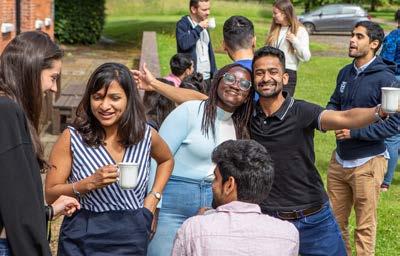






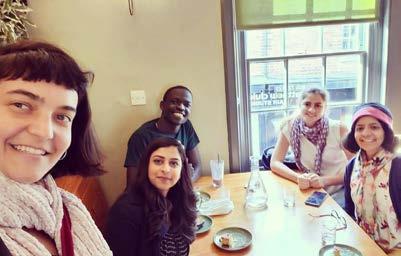
46
The scholarship helped us bond with like-minded people who surely will play a role in our future endeavours.”
“







48 whtrust WeidenfeldScholars whtrust_ox The Weidenfeld-Hoffmann Trust Weidenfeld-Hoffmann Trust, 23 Park End Street, Oxford, OX1 1HU, United Kingdom info@whtrust.org +44 (0)1865 411514 whtrust.org


 Alina Barnett Principal Mansfield College, University of Oxford
Alina Barnett Principal Mansfield College, University of Oxford





 Michael Lewis
Michael Lewis


 Alexandra Henderson Director, Weidenfeld-Hoffmann Trust
Alexandra Henderson Director, Weidenfeld-Hoffmann Trust
















 Samuel Diaz Pulgar Venezuela, Master of Public Policy
Samuel Diaz Pulgar Venezuela, Master of Public Policy























 ARCUA Maria Kuri & Melissa Penagos
ARCUA Maria Kuri & Melissa Penagos



 Tamarie Rocke, Kai Bridgewater & We’am Hamdan
Tamarie Rocke, Kai Bridgewater & We’am Hamdan



































 Bhanu Prasad India, 2019 Oxford-Hoffmann
Bhanu Prasad India, 2019 Oxford-Hoffmann























































































